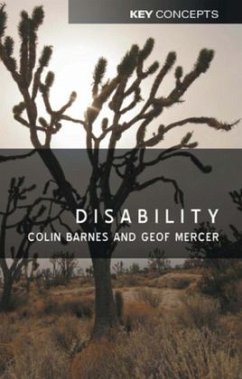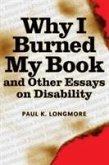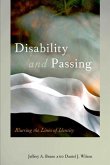For most of the twentieth century, people with disabilities have been regarded as victims of their condition and a burden on society. More recently, however, disabled people and their organizations across Europe and North America have challenged conventional explanations for their individual and collective disadvantage, calling for policy measures to change the image and status of disabled people in the Western world.
In this new book, Barnes and Mercer provide a concise and accessible introduction to the concept of disability. Drawing on a burgeoning disability studies literature from around the world, and from a range of disciplinary perspectives, the authors explore the evolution of this concept and offer a wide-ranging critique of established academic, policy and professional orthodoxies. The book highlights disabled peoples exclusion and marginalization in key areas of social activity and participation across different historical and cultural contexts, such as family life and reproduction, education, employment, leisure, cultural imagery and politics.
The analysis concentrates on disability as a distinctive form of social oppression similar to that experienced by women, minority ethnic and racial groups, and lesbians and gay men. Key issues addressed include: theorizing disability; historical and comparative perspectives; experiencing impairment and disability; professional and policy intervention in the lives of disabled people; disability politics, social policy and citizenship; and disability culture.
This will be essential reading for those studying sociology, social policy, social work, health studies, disability studies, and those in the therapy and nursing professions.
Hinweis: Dieser Artikel kann nur an eine deutsche Lieferadresse ausgeliefert werden.
In this new book, Barnes and Mercer provide a concise and accessible introduction to the concept of disability. Drawing on a burgeoning disability studies literature from around the world, and from a range of disciplinary perspectives, the authors explore the evolution of this concept and offer a wide-ranging critique of established academic, policy and professional orthodoxies. The book highlights disabled peoples exclusion and marginalization in key areas of social activity and participation across different historical and cultural contexts, such as family life and reproduction, education, employment, leisure, cultural imagery and politics.
The analysis concentrates on disability as a distinctive form of social oppression similar to that experienced by women, minority ethnic and racial groups, and lesbians and gay men. Key issues addressed include: theorizing disability; historical and comparative perspectives; experiencing impairment and disability; professional and policy intervention in the lives of disabled people; disability politics, social policy and citizenship; and disability culture.
This will be essential reading for those studying sociology, social policy, social work, health studies, disability studies, and those in the therapy and nursing professions.
Hinweis: Dieser Artikel kann nur an eine deutsche Lieferadresse ausgeliefert werden.
"In Disability , Barnes and Mercer raise the bar for any future discussions of the social model of disability. Their well-grounded work uses the social model to analyse the classic questions of the definition, production, representation, experience, stratification, exclusion, politics and globalization of disability. This timely book is a must read for students, scholars and activists."
Gary L. Albrecht, University of Illinois at Chicago
"This book is essential reading for all disability studies scholars. It is historically well-grounded and theoretically rigorous, carefully exploring theories of disability, impairment and the body. The nature of the social oppression experienced by disabled people is analysed, and disability is located in relation to gender, race and social class. Like all good sociology, the book is highly accessible and an excellent read."
Sheila Riddell, University of Glasgow
Gary L. Albrecht, University of Illinois at Chicago
"This book is essential reading for all disability studies scholars. It is historically well-grounded and theoretically rigorous, carefully exploring theories of disability, impairment and the body. The nature of the social oppression experienced by disabled people is analysed, and disability is located in relation to gender, race and social class. Like all good sociology, the book is highly accessible and an excellent read."
Sheila Riddell, University of Glasgow









